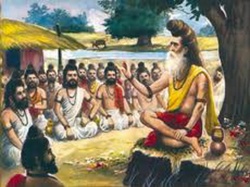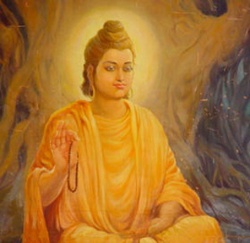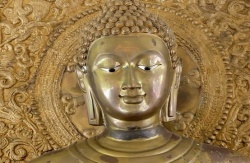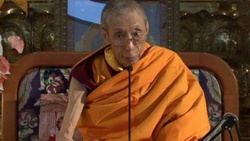Difference between revisions of "Attadīpa suttaṃ: An Island to Self"
(Created page with "{{DisplayImages|596|517|1220|402|1106|2732|769|722}} {{Centre|Saɱyutta Nikāya:<br/> III. Khandhā Vagga:<br/> 22: Khandhāsaɱyutta<br/> <big>Sutta 43</big><br/>...") |
|||
| Line 1: | Line 1: | ||
| − | {{DisplayImages|596|517|1220|402|1106|2732|769 | + | {{DisplayImages|596|517|1220|402|1106|2732|769}} |
{{Centre|[[Saɱyutta Nikāya]]:<br/> | {{Centre|[[Saɱyutta Nikāya]]:<br/> | ||
III. [[Khandhā Vagga]]:<br/> | III. [[Khandhā Vagga]]:<br/> | ||
| Line 11: | Line 11: | ||
<poem> | <poem> | ||
| − | [1-2] Thus have I heard:— | + | [1-2] [[Thus have I heard]]:— |
| − | The Exalted One was staying at Sāvatthī. | + | The [[Exalted One]] was staying at [[Sāvatthī]]. |
| − | Then (the Exalted One) said:— | + | Then (the [[Exalted One]]) said:— |
[3] 'Do ye abide, brethren, | [3] 'Do ye abide, brethren, | ||
islands unto yourselves, | islands unto yourselves, | ||
| − | refuges unto yourselves: | + | [[refuges]] unto yourselves: |
| − | taking refuge in none other; | + | [[taking refuge]] in none other; |
islanded by the Norm, | islanded by the Norm, | ||
| − | taking refuge in the Norm, | + | [[taking refuge]] in the Norm, |
| − | seeking refuge in none other. | + | seeking [[refuge]] in none other. |
[4] By them who are islands unto themselves, brethren, | [4] By them who are islands unto themselves, brethren, | ||
| − | who are a refuge unto themselves, | + | who are a [[refuge]] unto themselves, |
| − | who take refuge in none other, | + | who [[take refuge]] in none other, |
who are islanded by the Norm, | who are islanded by the Norm, | ||
| − | take refuge in the Norm, | + | [[take refuge]] in the Norm, |
| − | seek refuge in none other | + | seek [[refuge]] in none other |
| − | — by them the very source of things<ref>Yoni yeva upaparikkhitabbo. Yoni[so] is ab origine (cf. Yoniso manasikāro), so 'methodical attention.' Comy.,' kāraṇaŋ ti; upāyena manasikāro. K.S. i, p. 131.</ref> | + | — by them the very source of things<ref>[[Yoni]] yeva upaparikkhitabbo. [[Yoni]][so] is ab origine (cf. [[Yoniso]] manasikāro), so 'methodical [[attention]].' Comy.,' kāraṇaŋ ti; upāyena manasikāro. K.S. i, p. 131.</ref> |
is to be searched for: thus | is to be searched for: thus | ||
| − | — "What is the source of sorrow and grief, | + | — "What is the source of [[sorrow]] and [[grief]], |
| − | of woe, lamentation and despair? | + | of woe, [[lamentation]] and {{Wiki|despair}}? |
What is their origin?" | What is their origin?" | ||
| Line 44: | Line 44: | ||
the untaught many-folk, | the untaught many-folk, | ||
who discern not those that are Ariyans, | who discern not those that are Ariyans, | ||
| − | who are unskilled in the Ariyan doctrine, | + | who are unskilled in the [[Ariyan]] [[doctrine]], |
| − | untrained in the Ariyan doctrine, | + | untrained in the [[Ariyan]] [[doctrine]], |
| − | who discern not those who are worthy ones, | + | who discern not those who are [[worthy]] ones, |
| − | who are unskilled in the worthy doctrine, | + | who are unskilled in the [[worthy]] [[doctrine]], |
| − | untrained in the worthy doctrine, | + | untrained in the [[worthy]] [[doctrine]], |
| − | — these regard the body as the self, | + | — these regard the [[body]] as the [[self]], |
| − | the self as having body, | + | the [[self]] as having [[body]], |
| − | body as being in the self, | + | [[body]] as being in the [[self]], |
| − | the self as being in the body. | + | the [[self]] as being in the [[body]]. |
| − | But [the well-taught Ariyan disciple]<ref>The text omits 'the well-taught Ariyan disciple.'</ref> | + | But [the well-taught [[Ariyan]] [[disciple]]]<ref>The text omits 'the well-taught [[Ariyan]] [[disciple]].'</ref> |
beholding, brethren, | beholding, brethren, | ||
| − | the impermanence of body, | + | the [[impermanence]] of [[body]], |
its instability, | its instability, | ||
its coming to an end, | its coming to an end, | ||
| Line 62: | Line 62: | ||
"Formerly also, | "Formerly also, | ||
as well as now, | as well as now, | ||
| − | all bodies were impermanent and suffering, | + | all [[bodies]] were [[impermanent]] and [[suffering]], |
| − | unstable in nature." | + | unstable in [[nature]]." |
| − | Thus seeing it as it really is, | + | Thus [[seeing]] it as it really is, |
| − | by perfect insight, | + | by perfect [[insight]], |
he puts away from him | he puts away from him | ||
| − | all sorrow and grief, | + | all [[sorrow]] and [[grief]], |
| − | woe, lamentation and despair; | + | woe, [[lamentation]] and {{Wiki|despair}}; |
nor is he troubled at [38] their putting away, | nor is he troubled at [38] their putting away, | ||
| − | but untroubled lives at ease | + | but untroubled [[lives]] at ease |
and so living at ease | and so living at ease | ||
that brother is called | that brother is called | ||
| − | "one who is rid of all that."<ref>Tad-anga-nibbuto = tad'anga-vimutto — i.e., 'cooled down,' freed as to these [attributes] accordingly or respectively. — Cf. Pss. of the Sisters, 447</ref> | + | "one who is rid of all that."<ref>Tad-anga-nibbuto = tad'anga-vimutto — i.e., 'cooled down,' freed as to these [[[attributes]]] accordingly or respectively. — Cf. Pss. of the Sisters, 447</ref> |
[12] Beholding, brethren, | [12] Beholding, brethren, | ||
| − | the impermanence of feeling, | + | the [[impermanence]] of [[feeling]], |
its instability, | its instability, | ||
its coming to an end, | its coming to an end, | ||
| Line 84: | Line 84: | ||
"Formerly also, | "Formerly also, | ||
as well as now, | as well as now, | ||
| − | all feeling was impermanent and suffering, | + | all [[feeling]] was [[impermanent]] and [[suffering]], |
| − | unstable in its nature." | + | unstable in its [[nature]]." |
| − | Thus seeing it as it really is, | + | Thus [[seeing]] it as it really is, |
| − | by perfect insight, | + | by perfect [[insight]], |
he puts away from him | he puts away from him | ||
| − | all sorrow and grief, | + | all [[sorrow]] and [[grief]], |
| − | woe, lamentation and despair: | + | woe, [[lamentation]] and {{Wiki|despair}}: |
nor is he troubled at their putting away, | nor is he troubled at their putting away, | ||
| − | but untroubled lives at ease, | + | but untroubled [[lives]] at ease, |
and so living at ease | and so living at ease | ||
this brother is called: | this brother is called: | ||
"One who is rid of all that." | "One who is rid of all that." | ||
| − | So also with regard to perception, | + | So also with regard to [[perception]], |
| − | the activities | + | the [[activities]] |
| − | and consciousness.' | + | and [[consciousness]].' |
</poem> | </poem> | ||
| − | + | {{reflist}} | |
{{R}} | {{R}} | ||
[http://obo.genaud.net/dhamma-vinaya/pts/sn/03_kv/sn03.22.043.wood.pts.htm obo.genaud.net] | [http://obo.genaud.net/dhamma-vinaya/pts/sn/03_kv/sn03.22.043.wood.pts.htm obo.genaud.net] | ||
[[Category:Attadipa Sutta]] | [[Category:Attadipa Sutta]] | ||
Revision as of 16:43, 2 April 2014
Saɱyutta Nikāya:
III. Khandhā Vagga:
22: Khandhāsaɱyutta
Sutta 43
Attadīpa suttaṃ
An Island to Self[1]
Translated by F. L. Woodward
Edited by Mrs. Rhys Davids
Copyright The Pali Text Society
[1-2] Thus have I heard:—
The Exalted One was staying at Sāvatthī.
Then (the Exalted One) said:—
[3] 'Do ye abide, brethren,
islands unto yourselves,
refuges unto yourselves:
taking refuge in none other;
islanded by the Norm,
taking refuge in the Norm,
seeking refuge in none other.
[4] By them who are islands unto themselves, brethren,
who are a refuge unto themselves,
who take refuge in none other,
who are islanded by the Norm,
take refuge in the Norm,
seek refuge in none other
— by them the very source of things[2]
is to be searched for: thus
— "What is the source of sorrow and grief,
of woe, lamentation and despair?
What is their origin?"
[5] What then, brethren,
is the source,
the origin of these?
[6] Herein, brethren,
the untaught many-folk,
who discern not those that are Ariyans,
who are unskilled in the Ariyan doctrine,
untrained in the Ariyan doctrine,
who discern not those who are worthy ones,
who are unskilled in the worthy doctrine,
untrained in the worthy doctrine,
— these regard the body as the self,
the self as having body,
body as being in the self,
the self as being in the body.
But [the well-taught Ariyan disciple][3]
beholding, brethren,
the impermanence of body,
its instability,
its coming to an end,
its ceasing, says:
"Formerly also,
as well as now,
all bodies were impermanent and suffering,
unstable in nature."
Thus seeing it as it really is,
by perfect insight,
he puts away from him
all sorrow and grief,
woe, lamentation and despair;
nor is he troubled at [38] their putting away,
but untroubled lives at ease
and so living at ease
that brother is called
"one who is rid of all that."[4]
[12] Beholding, brethren,
the impermanence of feeling,
its instability,
its coming to an end,
its ceasing,
he says:
"Formerly also,
as well as now,
all feeling was impermanent and suffering,
unstable in its nature."
Thus seeing it as it really is,
by perfect insight,
he puts away from him
all sorrow and grief,
woe, lamentation and despair:
nor is he troubled at their putting away,
but untroubled lives at ease,
and so living at ease
this brother is called:
"One who is rid of all that."
So also with regard to perception,
the activities
and consciousness.'
Footnotes
- ↑ Lit., 'self-islanded'; usually rendered 'lamps (dīpa) unto yourselves.' Comy., Attadipa = tāṇaŋ, leṇaŋ, gati, parāyanaŋ = Atta-saraṇa. — i.e., 'shelter, cave of refuge, resort, goal, refuge. Cf. Dialog. ii, 108.
- ↑ Yoni yeva upaparikkhitabbo. Yoni[so] is ab origine (cf. Yoniso manasikāro), so 'methodical attention.' Comy.,' kāraṇaŋ ti; upāyena manasikāro. K.S. i, p. 131.
- ↑ The text omits 'the well-taught Ariyan disciple.'
- ↑ Tad-anga-nibbuto = tad'anga-vimutto — i.e., 'cooled down,' freed as to these [[[attributes]]] accordingly or respectively. — Cf. Pss. of the Sisters, 447






